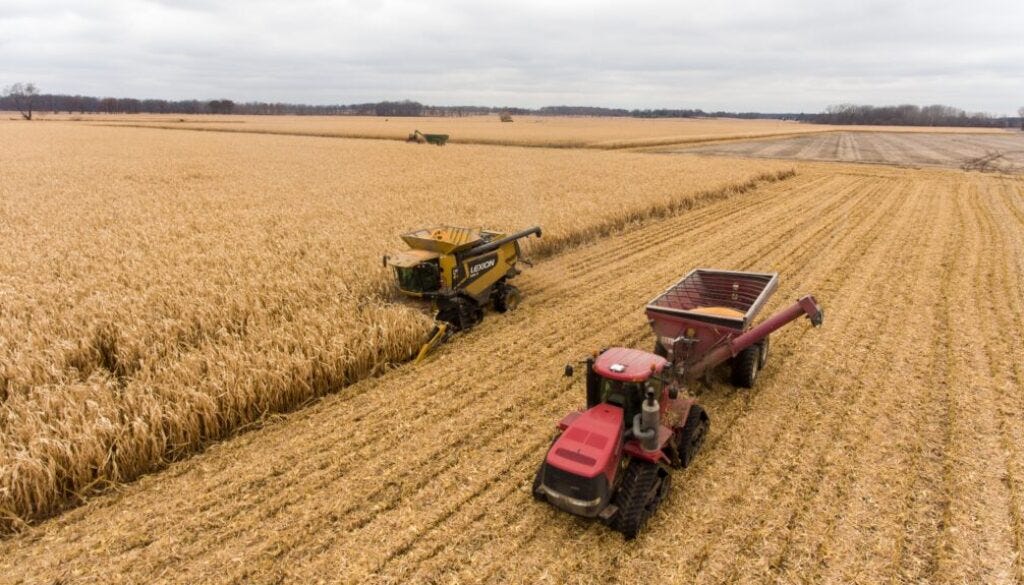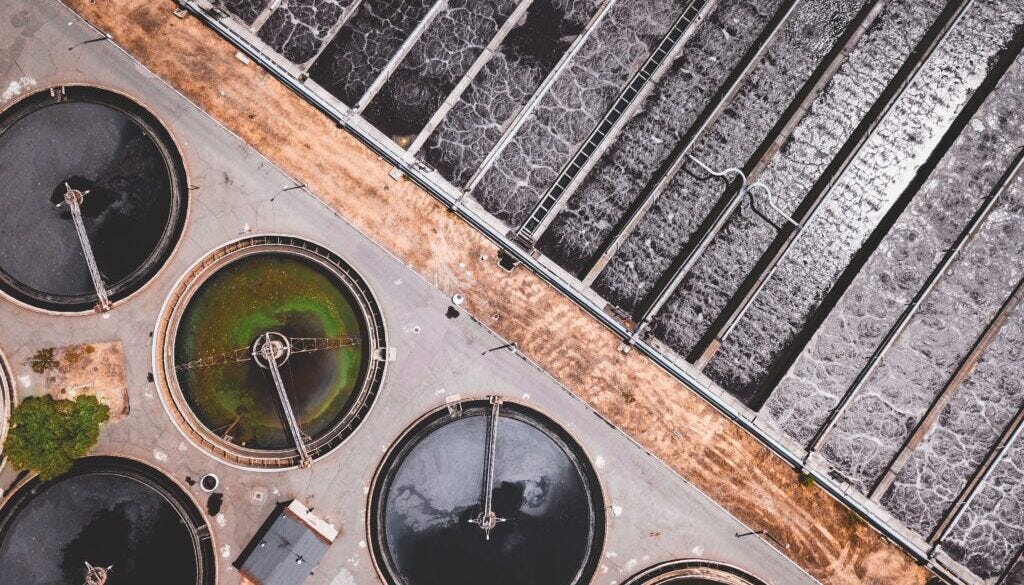Must-read recap: The New Lede's top stories
"Climate-smart" agriculture; the movement to quit natural gas; water systems at risk from cyber attacks.
As US pushes “climate-smart” agriculture, hopes and fears collide
(This is the second article in an ongoing series looking at how changing agricultural policies are affecting environmental health.)
For decades, leading US farm leaders have likened efforts to rein in harmful climate change as attacks on agriculture itself, aligning with oil and gas industry groups to block policies aimed at reducing greenhouse gas emissions.
That stance has slowly been shifting in recent years, and now, fueled by $3.1 billion in federal grants, farm country is poised to shape a new era of “climate-smart” agricultural practices and take a significant role in addressing the dire consequences of a warming planet.
The actions can’t come fast enough. A panel of international scientists warned this month that the world faces a “rapidly closing window of opportunity to secure a liveable and sustainable future,” and that the actions implemented over the next few years will have consequences “now and for thousands of years.”
The Biden Administration’s focus on agriculture is just one part of a larger effort to address climate change, but it is a key element. By funding 141 experimental projects, the administration is hoping to push an industry currently responsible for generating 10% of U.S. greenhouse gases, to the front of the nation’s work to reduce carbon emissions.
The first grants from the US Department of Agriculture (USDA), for 70 large projects, were awarded in September. A second round of funding, for 71 smaller projects, was awarded in December.
The scope of the climate-smart program is expansive. Grants range from $271,200 to teach climate-friendly practices to immigrant farmers in Iowa to $95 million to encourage grain farmers in 12 Midwest states to use cultivation methods that build soil fertility. In between are projects to expand organic and sustainable agriculture, sequester carbon on pastures where livestock graze, and develop carbon-reducing cultivation methods on farms operated by African Americans and Native Americans.
In all, more than 60,000 farms and 25 million acres of crop and rangeland are involved, with spending reaching all 50 states and Puerto Rico, according to the USDA. (Read the rest of the story.)
Postcard from California: How a local natural gas ban sparked a national culture war
Like some other once-fringe environmental ideas, this one began in Berkeley: In 2019, the staunchly progressive university town across the bay from San Francisco became the first US city to ban natural gas hookups in most new buildings, citing the fossil fuel’s contribution to the climate crisis.
From Berkeley, the no-new-gas movement spread steadily, one local jurisdiction at a time. As of last month, more than 70 California cities and counties had adopted ordinances mandating all-electric utilities and appliances in new construction. Nationwide, nearly 100 cities and counties, including New York City, Seattle and Montgomery County, Md., have moved to ban gas in new buildings.
But in January, the issue ignited a national political firestorm.
An official of the federal Consumer Product Safety Commission (CPSC) said a ban on gas stoves and ovens was “on the table” because emissions of hazardous air pollutants from gas stoves are strongly linked to childhood asthma. Said CPSC Commissioner Richard Trumka, Jr.: “Products that can’t be made safe can be banned.”
A fierce and hysterical backlash erupted, opening overnight a fresh front in the nation’s culture wars, as many on the right framed the idea as one more liberal assault on American freedom.
“I’ll NEVER give up my gas stove,” tweeted US Rep. Ronny Jackson of Texas. “If the maniacs in the White House come for my stove, they can pry it from my cold dead hands. COME AND TAKE IT!!”
Fox News’ Tucker Carlson railed against gas stove bans as nanny-state meddling that would destroy the restaurant industry – failing to note that most of the local ordinances make exceptions for commercial kitchens. “I would counsel mass disobedience in the face of tyranny in this case,” Carlson said.
Florida Gov. Ron DeSantis pandered to the faux outrage by proposing to permanently exempt gas stoves from sales tax. He admitted only 8 percent of Floridians cook with gas – tied for the lowest use in the nation – but said it was a matter of principle to resist big-government control.
Within a day, the chair of the CPSC was forced to walk back Trumka’s remarks, stating that while the commission will study the health risks of gas stoves it has no authority for such a ban, and no plans to push for one. The White House affirmed that President Biden doesn’t support a ban.
Away from Washington, however, the movement to quit gas is accelerating – and gaining urgency. (Read the rest of the opinion column.)
“Not a hypothetical”: US water systems at risk from cyber attacks
It’s been a little over two years since an unknown attacker tried to poison the water supply in Oldsmar, Florida by hacking into the computer system for the town’s treatment facility and boosting the sodium hydroxide — lye — in the water to perilously high levels.
An observant plant operator took immediate action to block the efforts before any damage was done. But as one of several similar efforts to tamper with US water systems, the February 2021 incident in Florida provides a stark warning of how vulnerable US water systems can be.
Now, US officials say these so-called “cyber threats” to drinking water supplies are growing, and they are pushing public water systems to tighten security around this type of threat. The Environmental Protection Agency (EPA) warned in a March 3 memorandum that many of the nation’s public water systems are at “high risk of being victimized by a cyber-attack” because they have failed to adopt basic protections.
“When we think about cybersecurity and cyber threats in the water sector, this is not a hypothetical,” EPA Assistant Administrator for Water Radhika Fox said at a press briefing earlier this month. “This is happening right now. We have seen these types of attacks from California to Florida, Kansas, Maine, and Nevada.”
The warnings follow a 2021 joint advisory issued by the EPA, the Federal Bureau of Investigation (FBI), the Cybersecurity and Infrastructure Agency (CISA), and the National Security Agency (NSA) that called on the water sector to implement protective measures. China-based hackers are a particular concern amid heightened geopolitical tensions.
US security experts have recently warned that China may attempt to create “chaos” in America through various means, including polluting US water systems via cyber attacks.
But the threats also come from within. In a 2019 incident, a former employee of a water facility in the small, rural community of Ellsworth County, Kansas used his cell phone to remotely log into the facility’s system and shut down processes the plant uses to clean and disinfect water. The EPA said the man’s actions “threatened the safety and health of an entire community.” (Read the rest of the story.)




Great article Carey and one of hope, if the politicians can get out of their own way and actually follow through on their land management promises!
I've been doing a deep dive into regenerative (holistic) farming practices which have been espoused by people like Allan Savory, author of Holitic Farming Practices 3rd edition 2016 but which he has been discussing since the 1980s and that of the Rodale Institute.
What govt officials in the industrialized world proclaiming the "climate emergency" and the need for drastic cuts in CO2 and other emissions seem to be missing, is the potential to solve many of our agricultural and climate woes by changing the way we manage land and produce food.
For example, in his book Mycelium Running: How Mushrooms Can Help Save the World, mycologist Paul Stamets outlines strategies for increasing soil health, increasing carbon sequestration and increasing food nutrition. Stamets explains that by incorporating mycelial networks into regenerative farming practices we could solve food and climate change challenges. By changing how we farm in the US, about 300 million tons of CO2 could be sequestered every year because the practice of no-till farming and drastically reduce fossil fuel inputs could not only transform convential farms from massive CO2 producing operations to sequester more emissions than they produce!
This very positive and hopeful story is clearly being ignored by politicians around the world who seek to villify farmers in the Netherlands and other countries painting them as larger villians that fossil fuel companies. Not only is this tragically laughable, it should immediately prompt the question that if we take farmers land away (presumably to turn into to more urban sprawl), where will our food come from? Eating insects and lab grown meat is the answer most often promoted but it is so flawed and assinine rendering it non-sensical.
I'd much rather eat grass fed & finished beef, healthier produce and an array of delicious mushrooms that are not only preferable to lab grown and insect fares, they are massively more nutritions, healthy and sustainable to both the plants they interact with but humans as well.
I'd be happy to send you references if you are interested in pursuing this avenue further.
Cheers!